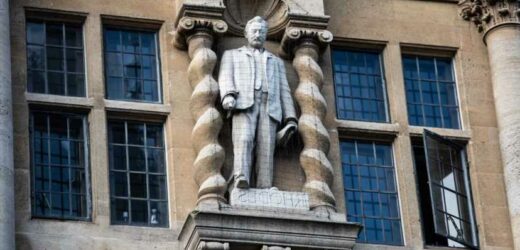MORE than 150 Oxford lecturers have pledged to boycott lessons and will refuse to teach their students after the university’s decision to keep the Cecil Rhodes statue.
Recommendations had been made to remove the controversial statue in Oriel College after an outcry over his links with Britain’s colonial past by Black Lives Matter protesters.
Objectors say Rhodes, a 19th century businessman and politician, represented white supremacy and is linked to colonialism and racism.
But Oriel College said it would not apply to remove the statue due to complex planning processes and high costs.
And the decision has now caused uproar across the campus – and classes could soon be a standstill.
Lecturers have said they will refuse to give tutorials and will withdraw from all talks, seminars and conferences sponsored by the college, reports the Telegraph.
But the boycott has been hit by criticism by the chairman of the Office for Students, Lord Wharton who says it would be “utterly unacceptable” if it meant any students’ education would suffer.
And the Tory chairman of the education select committee and a former skills minister, Rober Halfon says that the academics should just be “doing their jobs.”
He added: "Is it political posturing or is it looking out for students paying over £9,000 a year to study at their university?"
The woke dons published a “statements of a boycott of Oriel College” where they say the university "can only effectively and credibly work to eradicate racism and address the ongoing effects of colonialism today if all the colleges do so".
It reads: "Faced with Oriel's stubborn attachment to a statue that glorifies colonialism and the wealth it produced for the college, we feel we have no choice but to withdraw all discretionary work and goodwill collaborations."
Cecil Rhodes was a 19th century mining magnate who helped Victorian Britain colonise much of Southern Africa and held opinions that now offend modern values.
Rhodes was one of the era's most famous imperialists, with Rhodesia – now Zimbabwe – and Zambia named after him.
Born in Bishop's Stortford in 1853, he was a sickly child before heading to Africa aged 17.
He grew cotton before moving into diamond mining, founding the De Beers firm.
Who was Cecil Rhodes?
CECIL Rhodes was a 19th century mining magnate who helped Victorian Britain colonise much of Southern Africa and held opinions that now offend modern values.
Rhodes was one of the era' most famous imperialists, with Rhodesia – now Zimbabwe and Zambia – named after him.
Born in Bishop's Stortford in 1853, he was a sickly child before
heading to Africa aged 17.
He grew cotton before moving into diamond mining, founding the De Beers firm.
As Prime Minister of the Cape Colony from 1890 to 1896, his government restricted the rights of black Africans by setting financial qualifications for voting.
He attended Oriel College in 1873. On his death in 1902 the Rhodes Scholarship was set up to help non-British students study at Oxford.
Rhodes Scholars include Bill Clinton and three former Australian PMs.
Students campaigned to have the figure of Victorian empire builder torn down in 2016 over claims he was a racist.
But Oriel College decided to keep it following threats from wealthy donors to withdraw £100million in funding.
As Prime Minister of the Cape Colony from 1890 to 1896, his government restricted the rights of black Africans by setting financial qualifications for voting.
It comes after a committee of students in Magdalen college agreed a painting of Queen Elizabeth would be taken down because she "represents colonialism."
The portrait will now be replaced by “art by or of other influential and inspirational people.”
A majority of 10 to 2 members of the Middle Common Room (MCR) – a committee for post-grads – passed the motion
During the vote to remove the picture one student commented that “patriotism and colonialism are not really separable” .
While another added that the picture of Her Royal Highness must be ditched because “This is about our communal space and making people feel welcome”, according to Guido Fawkes.
And in the future if any pictures of the Queen or the Royal family are to be hung in the common it must be decided by a vote.
Source: Read Full Article




